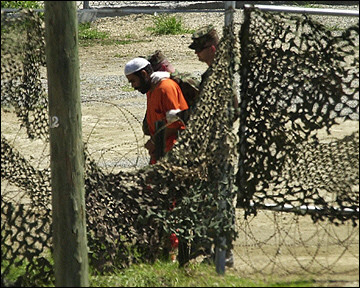|
Gitmo hunger striker wants tube removed
(AP)
Updated: 2005-10-26 09:19
A detainee on a hunger strike at the U.S. prison for terror suspects at
Guantanamo Bay wants a judge to order the removal of his feeding tube so he can
be allowed to die, one of his lawyers said Tuesday.
Fawzi al-Odah of Kuwait asked his lawyers during a meeting last week to file
court papers seeking the removal of his feeding tube "out of desperation" over
his imprisonment without charges, attorney Tom Wilner said.
"He is willing to take a stand if it will bring justice," Wilner said.
The lawyers have not filed the motion because they first want al-Odah to get
the approval of his family and to consult with doctors and psychological
specialists not affiliated with the U.S. government, Wilner said.
Al-Odah's family does not want the feeding tube removed, the attorney said.
There are 26 detainees participating in the hunger strike, which began Aug.
8. Almost all are being force-fed through nasal tubes, Martin said. Defense
lawyers said the detainees are seeking to face trial or be released. Other
complaints include the quality of the food and water and alleged abuse by guards
and interrogators.

In a file photo from 2002, a detainee at Camp X-Ray in
Guantanamo Bay, Cuba, is walked back to his caged cell from a
interrogation hut by two US Army
MPs.[AFP/file] | Al-Odah, a 28-year-old who was arrested in Pakistan in 2002, weighed 139
pounds three years ago and is now down to 112 pounds, according to government
records cited by his attorneys in court papers.
Al-Odah's request, which was mentioned in court papers filed by Wilner in
Washington, raises a number of ethical and legal issues, including whether his
lawyers would be able to continue representing al-Odah and his parents if they
disagree on whether to file the motion.
"If it gets to the point where he says 'I want to die' and his parents say
no, then we have a conflict," said Wilner, the lead attorney for 11 Kuwaitis
held at Guantanamo. "We could represent one or the other but not both."
The U.S. military has said that it considers hunger strikes a form of suicide
and will take whatever steps are necessary to prevent any detainee deaths at the
prison. Officials said they wouldn't comment on specific cases.
"The detainees are clinically stable, closely monitored by medical
professionals, and will continue to receive appropriate nutrition, fluids, and
excellent medical care," said Guantanamo spokesman Lt. Col. Jeremy Martin.
The government says it is holding some 500 men on suspicion of links to
terrorism at the Guantanamo facility.
|